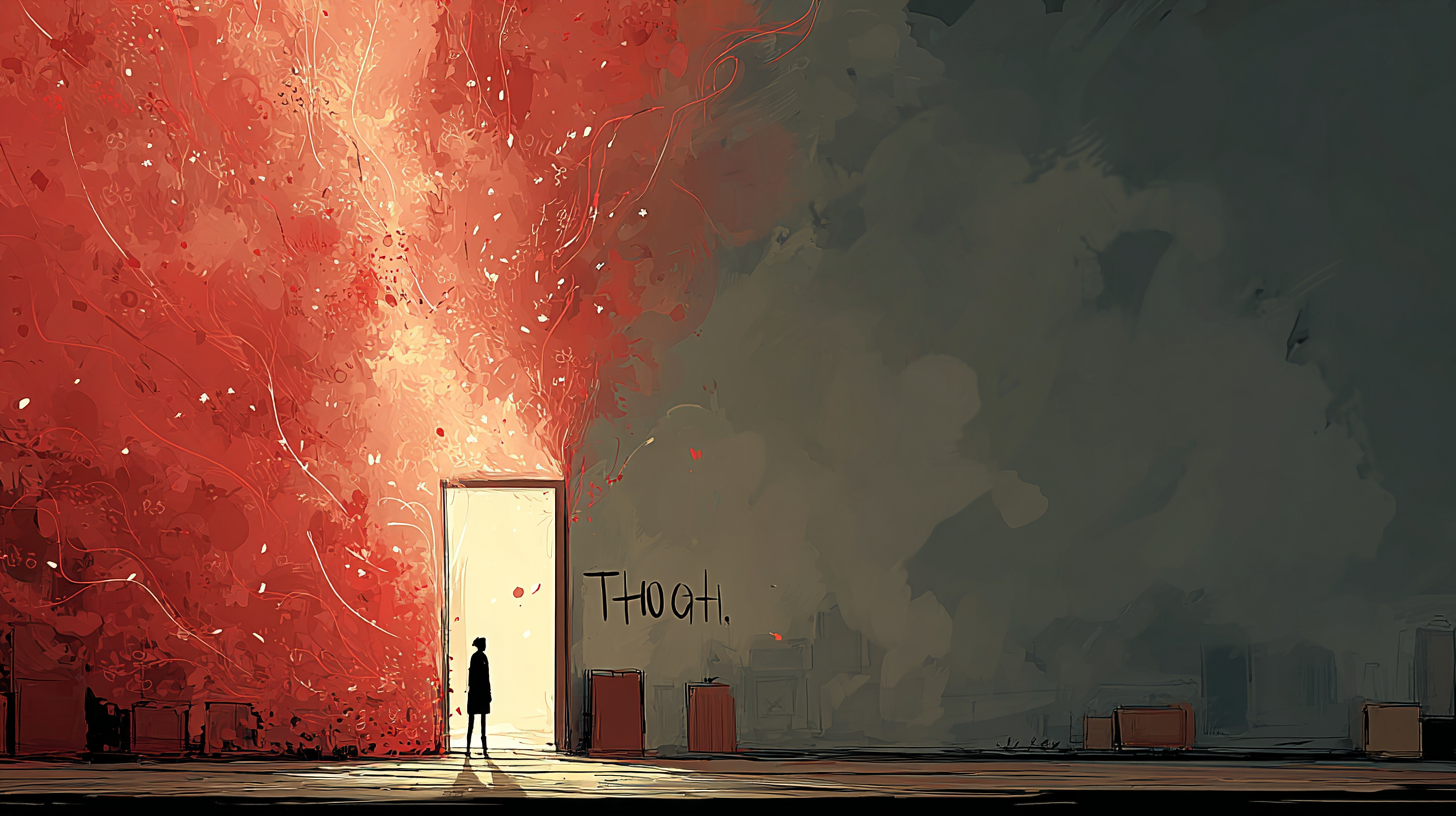“Though” is used to show something opposite or different.
「though」は「でも」「〜だけれど」と、何か逆のことを言うときに使う。
以下は英単語 “though” に関するストーリー型学習コンテンツです。まずは大枠の意味を理解して最後の文章で確認しましょう。
主な意味(main meaning)
| 品詞 | 意味 | 発音記号 (IPA) | 英語例文 |
|---|---|---|---|
| 接続詞 (conjunction) | ~だけれども | /ðoʊ/ | I went out, though it was raining. |
| 副詞 (adverb) | でも、やっぱり | /ðoʊ/ | It’s expensive. I’ll buy it, though. |
語源(etymology)
「though」は古英語の「þēah(theah)」に由来し、「それにもかかわらず」という意味を持つ。
核心イメージ:逆のことを言うときの“ゆれ”や“対比”
類義語(synonyms)
| 類義語 | 英文例文 |
|---|---|
| although | Although he is young, he is very smart. |
| even though | Even though it was late, they continued working. |
| however | She is tired. However, she keeps studying. |
| nevertheless | It was cold. Nevertheless, they went swimming. |
| yet | He’s rich, yet he lives simply. |
反義語(antonyms)
| 反義語 | 英文例文 |
|---|---|
| because | He stayed home because he was sick. |
| since | Since it’s raining, we’ll stay inside. |
コロケーション(collocations)
| コロケーション | 英語例文 |
|---|---|
| even though | Even though he failed, he tried again. |
| though it seems | Though it seems easy, it’s quite hard. |
| as though | He looked as though he had seen a ghost. |
| hard though it is | Hard though it is, I won’t give up. |
| strange though it may be | Strange though it may be, it’s true. |
2項表現(binomials)
| 2項表現 | 英語例文 |
|---|---|
| win or lose, though or not | Win or lose, he’ll try. Though or not, he’s joining. |
| rich and poor alike | Rich and poor alike, they came to the festival. |
英語ストーリー(english story)
Title: “Though It’s Hard”
Lisa had always dreamed of becoming a graphic designer. Though she had no formal training, she practiced every day after work. Her friends often said, “Even though you’re tired, you keep drawing. That’s amazing!”
Lisa replied, “Hard though it is, I want to improve.”
One day, she applied for a job. She knew the competition was strong. “Although I’m nervous, I’ll try my best,” she thought.
The interview was tough, and the interviewer seemed strict. Nevertheless, Lisa stayed confident and showed her portfolio.
The next week, Lisa got a call. She didn’t get the job.
She was disappointed. However, she didn’t give up.
She said to herself, “Strange though it may be, I feel stronger now.”
She continued applying and practicing. Finally, she received an offer from a small design company.
Her first project was hard, but she remembered her journey and smiled. Though it was never easy, it was worth it.
和訳
タイトル:「難しくても」
リサはずっとグラフィックデザイナーになることを夢見ていた。**though(〜だけれども)**正式な訓練は受けていなかったが、彼女は毎日仕事のあとで練習を続けた。
友人たちはよく言った。「**even though(〜にもかかわらず)**疲れてるのに、ずっと描いてるね。すごいよ!」
リサはこう返した。「hard though it is(難しいけれど)、うまくなりたいんだ。」
ある日、彼女は仕事に応募した。競争は激しいことを知っていた。「**although(〜だけれども)**緊張してるけど、全力を尽くそう」と思った。
面接は厳しく、面接官も厳しそうだった。nevertheless(それにもかかわらず)、リサは自信を持ってポートフォリオを見せた。
次の週、リサに電話が来た。結果は不採用だった。
彼女はがっかりした。however(でも)、諦めなかった。
「strange though it may be(変かもしれないけど)、今は前より強くなった気がする」と彼女は自分に言い聞かせた。
彼女は応募を続け、練習もやめなかった。ついに、小さなデザイン会社からオファーをもらった。
最初のプロジェクトは大変だったが、これまでの道のりを思い出し、リサは微笑んだ。**though(〜だけれども)**簡単ではなかったけれど、その価値はあった。
Q&A
Q: “though” と “although” の違いは?
A: どちらも「〜だけれども」という意味で使われますが、”though” はより口語的・カジュアルに使われ、文末に置かれることもあります。”although” はよりフォーマルで、主に文頭や文中で使われます。
Q: “though” と “even though” の違いは?
A: “even though” は “though” よりも逆接の強調が入ります。日本語では「〜にもかかわらず」と訳されることが多く、「事実に反する強調」が含まれます。たとえば「たとえ本当にそうでも、驚かない」といったニュアンスです。
Q: “though” と “however” の違いは?
A: “though” は接続詞にも副詞にもなりますが、”however” は副詞です。”however” は「しかしながら」と訳され、文を切って論理的に対比するときに使います。位置は主に文頭かカンマの後です。
Q: “though” と “nevertheless” の違いは?
A: “nevertheless” も副詞で、「それにもかかわらず」という意味です。”though” よりもかたく、書き言葉で使われやすいです。事実があっても行動を変えないことを強調します。
Q: “though” と “yet” の違いは?
A: “yet” は副詞や接続詞として使われます。意味は似ていますが、”yet” は「それでもなお」という対立や意外性をややドラマチックに表します。”though” の方が自然で軽い印象です。
Q: “though” と “because” の違いは?
A: “though” は「逆のこと」を言うのに対し、”because” は「理由」を説明する接続詞です。意味は正反対です。
Q: “though” と “since” の違いは?
A: “since” も「理由」を表します(「〜なので」)。”though” は「〜なのに」と逆の意味で、対比を強調します。
Q: “though” と “as though” の違いは?
A: “as though” は「まるで〜のように」という比喩・仮定の表現です。”though” は単に逆接を示すだけなので、文法も意味も異なります。
Q: “though” と “hard though it is” の違いは?
A: “hard though it is” は倒置構文と呼ばれる表現で、「難しいけれども」という意味。”though” を強調したフォーマルで書き言葉的な言い回しです。
Q: “though” と “strange though it may be” の違いは?
A: “strange though it may be” は「変かもしれないが」という意味で、”though” を使った決まり文句の一つです。強調構文や文語的なスタイルでよく使われます。



コメント